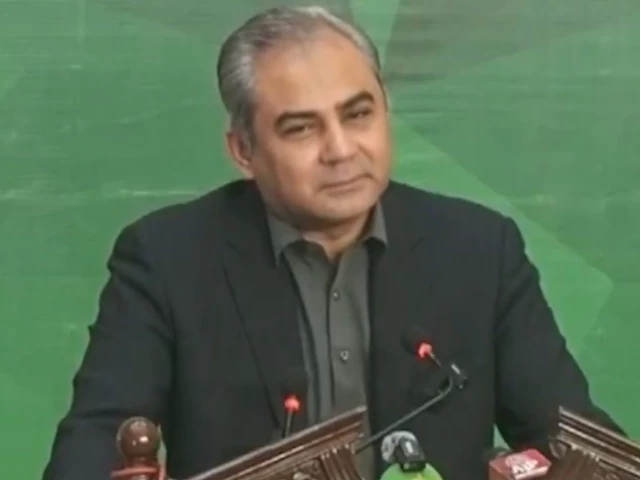Interior Minister Mohsin Naqvi praised Pakistan’s intelligence agencies on Sunday for his critical role during the recent conflict with India, claiming that they had early access to enemy plans and even obtained video images of six Indian airplanes that demolished.
The recent confrontation between the two neighboring countries, triggered by Pahalgam’s attack, marked one of the most serious escalations in decades, pushing rivals with nuclear weapons on the edge of the war on a large scale. The conflict resulted in civilian casualties on both sides before diplomatic efforts managed to calm tensions.
During the exchange, the Pakistan Air Force demolished six Indian aircraft, including a French -made Rafale combat plane. Later, a senior French intelligence official confirmed the loss of at least one rafale, marking the first combat fall of the plane.
Read too: Monzón’s rains cause generalized floods through Punjab
Speaking in a seminar organized by the Professor Waris Mir Foundation in Aiwan-E-Iqbal, Naqvi said: “The role of our intelligence agencies was so important … we knew what they planned, what plane they would use.” He added: “In a matter of minutes, we receive video images of the six aircraft that were shot down.”
The minister revealed that intelligence agencies received detailed information about India’s plans very anticipated, including confidential intelligence and operational documents.
“We used to have all the details of the decisions and documents of India in advance. Later, when his planes were shot down, it was decided that until we had evidence, we would not announce how many planes we had been shot down. We needed field proof, and believe me, in a matter of minutes, the evidence was with us. We have videos of six Indian planes that were rejected.”
Naqvi attributed part of Pakistan’s success during the conflict to divine intervention. “India triggered seven missiles in one of our main bases, containing valuable assets. They were all worried, but not a single missile landed inside the base, some fell before arriving, some outside and others on one side,” he said.
He added that when Pakistan took reprisals, his missiles hit an Indian oil storage deposit without causing civilian casualties. “This was Allah’s purely help,” he said.
He also praised the military leadership of Pakistan, particularly the Syed field marshal also. Naqvi recalled a meeting with a Saudi Visiting Delegation that included military and government officials. The field marshal said, he said: “India is like a brilliant Mercedes, but we are like a dumeration truck loaded with stones. Now imagine what happens when the two collide.”
Highlighting the unique unit within the leadership of Pakistan, Naqvi said: “For the first time in the history of Pakistan, the Army, the Air Force and the Navy devised a joint strategy and fought against the war under a plan.” This contrasts with the fractured command structure of India, where military leaders, according to reports, operated independently.
Read: PM displays ministers to supervise the relief of KP floods when the toll reaches 323
Naqvi also appointed Ajit Doval and Amit Shah as the true intellectual authors behind the escalation of the Indian government. “These are the two men behind everything, and they will drown, as well as Modi,” he warned.
He emphasized the domestic political unit in the middle of the crisis: “On the side of Pakistan, all political parties were united … Everyone was in contact and supported.” According to NAQVI, Pakistani leaders exceeded the attempts of the Indian delegation to press internationally, pointing out: “Our PPP president surpassed them.”
The minister also accused India of sponsoring terrorism within Pakistan, particularly in Baluchistan, and said that India used the war to suppress the puppy. He praised the resilience shown by the prime minister and national leadership when responding firmly, saying that they challenged the pressure of not taking reprisals.
The seminar also had addresses from the president of Senate Syed Yusuf Raza Gillani and the president of the Punjab Assembly, Malik Muhammad Ahmad Khan.




